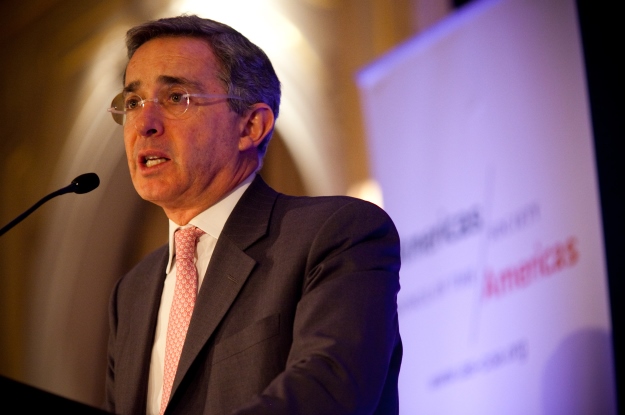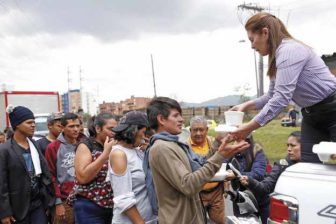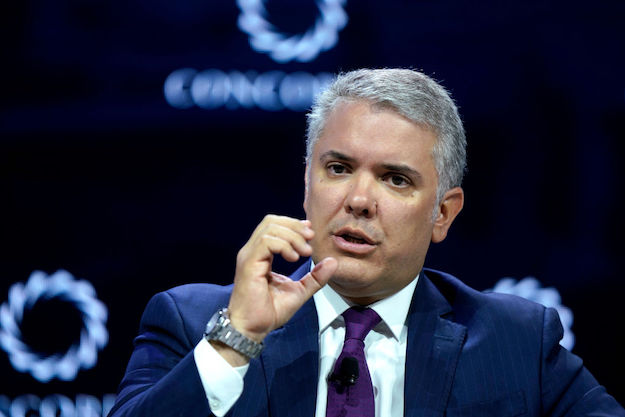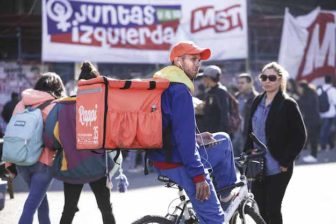It’s been a challenging few years for Álvaro Uribe. His 2002-10 presidency of Colombia is still credited with a historic drop in violence and robust economic growth rates. But since leaving office with an approval rating upward of 75 percent, Uribe has watched the country move in a different direction. His chosen successor Juan Manuel Santos surprised almost everyone by seeking a peace deal with the Revolutionary Armed Forces of Colombia (FARC) – resulting in a now-infamous rivalry that has played out noisily on Twitter and elsewhere.
Disclosure: I helped Uribe write his memoirs in 2012, and we’ve remained in contact ever since. But until catching up with him at Princeton University last week, I hadn’t actually seen Uribe for almost three years. During that time, I’ve heard the same whispers as everybody else – that his opposition to a peace deal is more personal than principled, or that he was failing to grasp a historic moment to end the Western Hemisphere’s longest-running insurgency.
So what did I see? Well, in short: The same Uribe as always. Energetic, unyielding and on-message as he spoke to a group of graduate students about the economic crisis currently hitting many emerging markets, and his objections to the peace negotiations. Now a senator, Uribe says the deal would result in impunity for even the FARC’s most grave crimes – a concern voiced by many others including Human Rights Watch. “Every time in our history that we’ve had impunity, those same people come back and commit crimes,” Uribe told the students.
Nevertheless, in a short interview afterward for AQ, I pressed Uribe on whether the costs of the deal aren’t outweighed by the benefits to Colombia’s security, economy and international image. I also asked him about his supposed “vendetta” with Santos – and why he really opposes the negotiations. What follows is a transcript, lightly edited for length and clarity, and with hyperlinks for additional context.
BW: Do you believe President Santos will succeed in signing a peace agreement?
AUV: Of course he’ll sign one. If President Pastrana had ceded to the FARC half of what Santos has given them, they would have signed with him. This isn’t a peace deal, it’s a capitulation in favor of the FARC.
BW: The Colombian people still have to approve a plebiscite…
AUV: … which according to Colombian legislation should have had a threshold of 50 percent (for approval). But they lowered it to 13 percent. It won’t have a single question. And Santos says whoever doesn’t vote for the plebiscite, it’s because they want war. We all want peace. But there are many of us who don’t want impunity.
BW: What’s the main problem with peace as proposed by President Santos?
AUV: There are many. They’ve put the Colombian public forces on the same level as the guerrilla. Security has worsened a lot. The country that had cocaine production of 200 (metric) tonnes a year is now back up to 400 and in 2015 it may have been even higher. They’re turning drug trafficking into a political crime. The FARC, even for atrocious crimes, won’t have punishment – you’ll admit to your crime and you won’t go to jail. They’re giving them political eligibility – What would have happened if we’d accepted this for the paramilitaries?
The government is accepting the FARC as its partner in combating drugs, when the FARC is the world’s biggest cocaine cartel. They’re putting the FARC as an interlocutor for rural policies in Colombia. That seems to me like a big risk – that the tormentor of rural Colombia be the interlocutor for rural policies.
BW: But these days the FARC doesn’t have the power, doesn’t have the military capacity that it did in the past, thanks in large part to what you did in your government. So the political cost of a deal is pretty low, isn’t it?
AUV: Not today. Today, it’s high. Because in the last five years the FARC has built a lot of strength. It has rearmed. Since July 20 of last year there has been a decline in some crimes – roadblocks, for example. But it’s not because of security – it’s because of a FARC truce. But there’s been a rise in extortion, drug trafficking, territorial control and rearming.
And what’s more, they’re doing something else – the ELN, which is the second-biggest guerrilla, was very weak – and many people in the FARC are committing crimes (now) in ELN uniforms.
BW: They’re changing uniforms.
AUV: Of course … Where do I hear this? From what the credible community tells me. Now, all this impunity will do is provide more bad examples and create more violence.
BW: But there are few of them. The truth is, we’re talking about – How many FARC are there now?
AUV: When I started my government, there were 30,000.
BW: And now?
AUV: At the end of my government there were 6,800. Now, we don’t know how many there might be. But there aren’t fewer … and what’s more, since Santos is going to give them some money for several years, they’re recruiting many people so they can benefit from the demobilization.
BW: Do you have evidence of that?
AUV: I have evidence. For example, last week they did it in a place named Juan José, in the municipality of Puerto Libertador.
BW: One comment you hear a lot in Washington is that your problem with the peace agreement is personal, related to a vendetta against Juan Manuel Santos. What’s your reaction?
AUV: Before, they said it was a vendetta because of the death of my father. I’ve never done the politics of vendettas; I’ve done the politics of convictions. So you’d have to see what has changed. If my theses have changed, or if Juan Manuel Santos offered one thing to the country in 2010 and then did another in the government.
—
Winter is editor-in-chief of Americas Quarterly.
Any opinions expressed in this piece do not necessarily reflect those of Americas Quarterly or its publishers.









